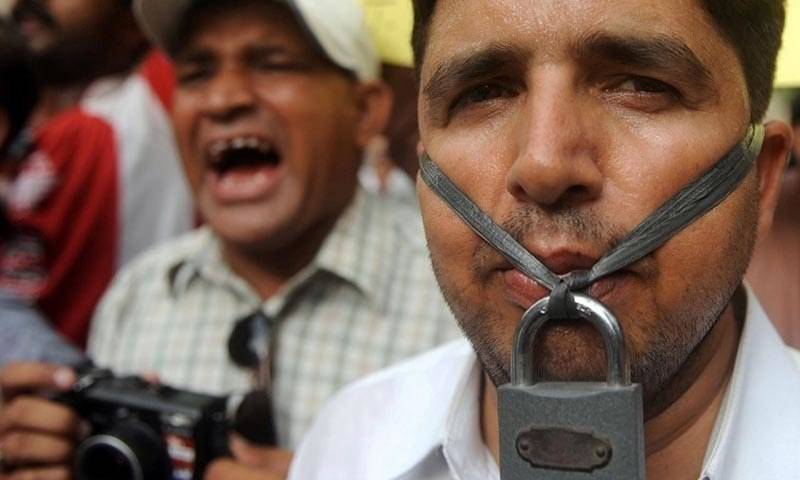
In a matter of seconds, Pakistan’s law and order was ripped apart as journalist Matiullah Jan was abducted in broad daylight outside a school in Islamabad today. The bizarre video footage showing Matiullah Jan being forced into a car by armed men is a testament to the abject failure of the government to enable safety for journalists.
It renders Prime Minister Imran Khan’s statement that media is freer in Pakistan than the United Kingdom as a lie. No one knows who did this today but everybody can say with certainty that Pakistan is a bed of thorns for media personnel.
Constitution civilises the state but most importantly, it entails rights for people residing in a country. Let there be no mistake that the right to life and freedom are paramount for a citizen of the state. Matiullah Jan, or any other journalist, deserves his basic rights to be respected but enemies of media freedom in Pakistan have no regard for freedom. While vilification and demonisation of critical voices/regime critics is daily business by sponsored accounts, kidnapping is not, and it is our responsibility as a civil society to make sure it does not become routine business.
Reporters Without Borders ranked Pakistan 145 in the World Press Freedom index. From protests outside Dawn newspaper office to the purging of journalists from mainstream media via state pressure, Pakistan is a dark place for media freedom.
Many people were flushed out of the system through practices like direct pressure to censor stories critical to the government. The pressure is often reportedly exerted directly to producers, anchors, and reporters. If that doesn’t suffice, costly interventions have taken place such as pulling TV stations from the transmission, targeting advertising revenue or disrupting newspapers from circulation.
Perhaps the most important aspect of media censorship and lack of media freedom stems from an ardent desire to control everything that is said. The quest to control discourse and narrative in today’s regime is unprecedented because it goes beyond the confines of electronic or print media. The coordinated and vicious campaign was visible when universities were forced into firing academics.
The campaign predates 2020 when an exhibition at the Karachi Biennale called ‘The Killing Fields of Karachi’, which addressed the extrajudicial deaths of 444 people at the hands of encounter specialist Rao Anwar, was raided by the authorities and shut down.
This is exactly why the producer of one of Pakistan’s top shows stated in an interview to the Guardian “There are many layers of censorship by many quarters... it’s more sophisticated, and more nuanced, than it has been in the past”.
While there is no clue about the perpetrators of this incident, the attack on Matiullah Jan is an attack on all of us because it demonstrates an increasing desire to quell and curb anyone who speaks critically. It is an attack on the constitution of Pakistan. It is now the responsibility of Prime Minister Imran Khan to ensure the safe return of Matiullah Jan to his family and restore the precious trust that is all but lost between civil society and the government.
It renders Prime Minister Imran Khan’s statement that media is freer in Pakistan than the United Kingdom as a lie. No one knows who did this today but everybody can say with certainty that Pakistan is a bed of thorns for media personnel.
Constitution civilises the state but most importantly, it entails rights for people residing in a country. Let there be no mistake that the right to life and freedom are paramount for a citizen of the state. Matiullah Jan, or any other journalist, deserves his basic rights to be respected but enemies of media freedom in Pakistan have no regard for freedom. While vilification and demonisation of critical voices/regime critics is daily business by sponsored accounts, kidnapping is not, and it is our responsibility as a civil society to make sure it does not become routine business.
Reporters Without Borders ranked Pakistan 145 in the World Press Freedom index. From protests outside Dawn newspaper office to the purging of journalists from mainstream media via state pressure, Pakistan is a dark place for media freedom.
Many people were flushed out of the system through practices like direct pressure to censor stories critical to the government. The pressure is often reportedly exerted directly to producers, anchors, and reporters. If that doesn’t suffice, costly interventions have taken place such as pulling TV stations from the transmission, targeting advertising revenue or disrupting newspapers from circulation.
Perhaps the most important aspect of media censorship and lack of media freedom stems from an ardent desire to control everything that is said. The quest to control discourse and narrative in today’s regime is unprecedented because it goes beyond the confines of electronic or print media. The coordinated and vicious campaign was visible when universities were forced into firing academics.
The campaign predates 2020 when an exhibition at the Karachi Biennale called ‘The Killing Fields of Karachi’, which addressed the extrajudicial deaths of 444 people at the hands of encounter specialist Rao Anwar, was raided by the authorities and shut down.
This is exactly why the producer of one of Pakistan’s top shows stated in an interview to the Guardian “There are many layers of censorship by many quarters... it’s more sophisticated, and more nuanced, than it has been in the past”.
While there is no clue about the perpetrators of this incident, the attack on Matiullah Jan is an attack on all of us because it demonstrates an increasing desire to quell and curb anyone who speaks critically. It is an attack on the constitution of Pakistan. It is now the responsibility of Prime Minister Imran Khan to ensure the safe return of Matiullah Jan to his family and restore the precious trust that is all but lost between civil society and the government.
